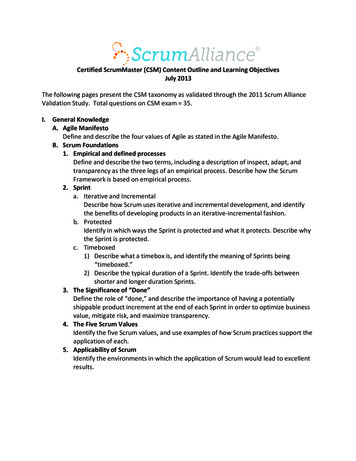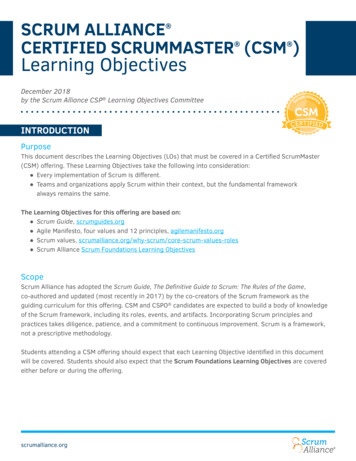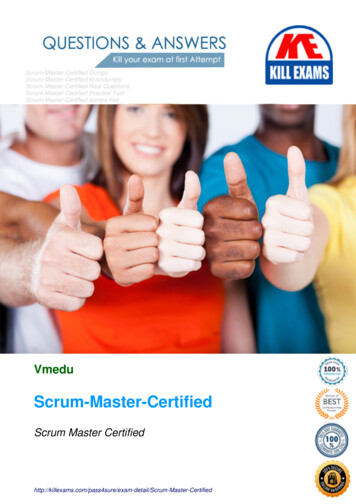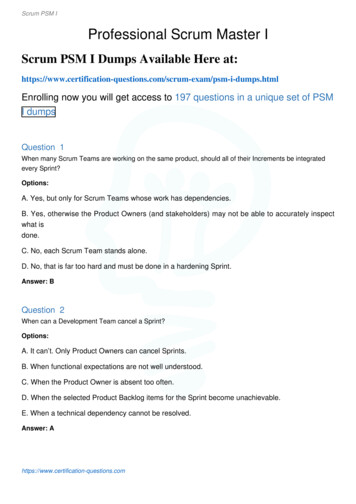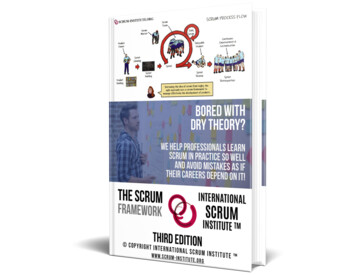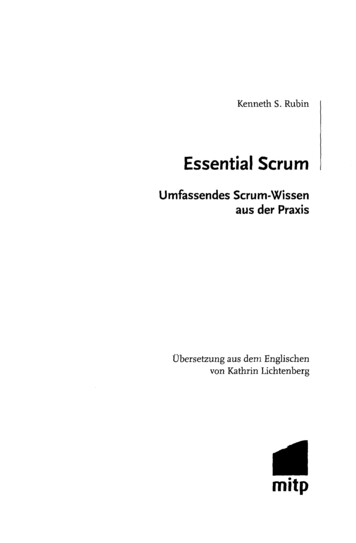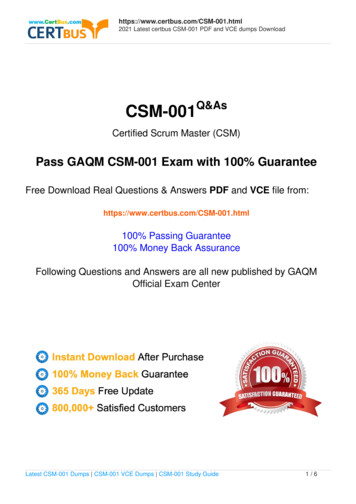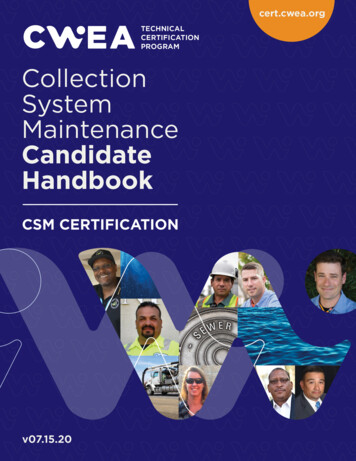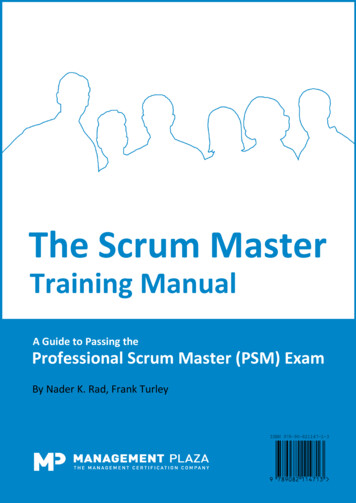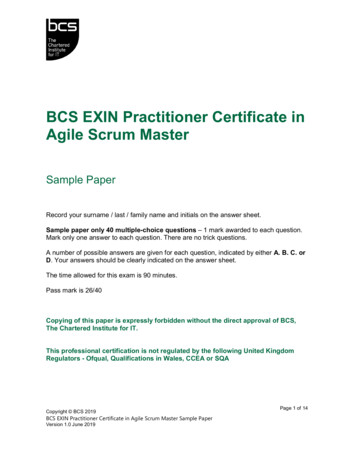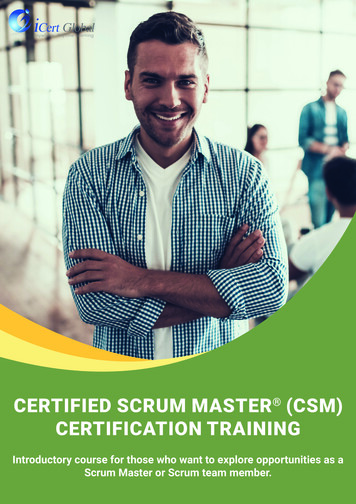
Transcription
CERTIFIED SCRUM MASTER (CSM)CERTIFICATION TRAININGIntroductory course for those who want to explore opportunities as aScrum Master or Scrum team member.
Benefits of CSM CertificationLearn the Scrum framework and gain an understanding of teamroles, events, and artifacts.Expand the scope of your career with opportunities across allindustry sectors adopting Agile practices.Learn the foundation of Scrum and the scope of the roleShowcase your Scrum knowledge.Engage with Agile practitioners committed to continuousimprovement.Increased employability.Career advancement.Higher salaries.2
Key Features2-day full-time intensive CSM training classroom course at alocation near youEarn 16 PMI PDUs2 full-length CSM simulation testsCSM Exam Fee and Scrum Alliance membership includedCourse Completion CertificateLearn from Scrum Alliance Certified Scrum Trainer Live Online Training also available on demand3
Modes of EngagementInstructor-Led Classroom Training2-Day CSM Certification exam prepclassroom training workshopsconducted worldwide.Instructor-Led Live Online TrainingProvided to your company’s employeesacross global locations through CitrixGoToMeeting or Cisco WebEx.Self-Paced E-LearningAnywhere, anytime access to E-Learningthrough a Learning ManagementSystem for employees across the globe.Enterprise TrainingIn-House certified instructor-led 2-dayCSM certification training in youroffice across global locations.4
CSM - Course Agenda1. INTRODUCTION TO AGILE AND SCRUMWhy Agile?Traditional Development.Problems with traditional software development.Usage of features in a system.Makings of a new approach.Agile Manifesto.Principles behind the Agile Manifesto.Authors of the Agile Manifesto.Agile Project Management.Agile Project Management Life-cycle.Agile Project Management Framework.APM Framework.What is Scrum?Certified Scrum Master.Professional Scrum Master.PMI-ACP.2. AGILE METHODOLOGIESAgile Methodologies.Crystal.7 Project Properties in Crystal.Samples of Crystal.Feature-Driven-Development.Roles in FDD.Processes in FDD.Project tracking in FDD.Project tracking methodology.FDD usage guidelines.Dynamic Systems Development Methodology (DSDM).Planning in DSDM-Atern.DSDM Principles and techniques.eXtreme Programming.XP Values.XP Practices.XP Benefits.5
CSM - Course Agenda2. AGILE METHODOLOGIESAgile Unified Process.Agile Unified Process (AUP).Agile Unified Process – System Development.Scrum.Scrum Life-cycle.3. SCRUM ROLESStakeholders.Chicken and Pig roles.Management of stakeholders.Scrum life-cycle.Product Owner.Product Owner’s role.Prioritization.Cost-Benefit Analysis.Prioritization based on Value and Risk.Prioritizing requirements - MoSCoW.Prioritizing requirements – Kano Model.Prioritizing requirements – Relative weighting method.Scrum life-cycle.Scrum Master.What does a Scrum Master Do.What the Scrum Master Should NOT do.Scrum life-cycle.The team – aka Developers.Building a Scrum team.Building empowered teams.Role of a Manager.Manager 2.0: A new role for a Manager.Some specialist roles you may want.6
CSM - Course Agenda4. SCRUM CEREMONIESTime-boxing.Advantages of time-boxing.Time-boxing.Release.High-level view of a release.Sprints.Factors in selecting a Sprint duration.Intensity of work.No changes in a Sprint.Daily Scrum.Sprint Review.Also check during a review.Sprint Retrospective.What is a Sprint Retrospective.Making retrospectives effective.Making retrospectives effective.5. SCRUM ARTIFACTSProduct backlog.Product, release and sprint backlog.User story.Story card information.Multiple stories may be required to complete a feature.Epics.Writing good stories.Splitting user stories.Splitting user stories (big picture)Splitting user stories (user experience)Splitting user stories (Others)6. SCRUM BEST PRACTICESRefactoring.Pair programming.Continuous integration.Practices of continuous integration.Configuration management.7
CSM - Course Agenda6. SCRUM BEST PRACTICESQuality in Agile.Scrum Quality – Home truths.Planning for a Sprint.Test-driven development.Advantages of TDD.Definition of “Done”.7. SCRUM PLANNINGPrinciples behind Agile planning.Iterations allow for mid-course corrections.Multiple levels of planning.Release planning.Steps to planning a release.Release Planning.Velocity.Sprint planning.Velocity driven sprint planning.Commitment driven sprint planning.Planning for each story.Keep in mind before finalizing the plan.8. SCRUM ESTIMATIONPrinciples behind Scrum estimation.Estimation techniques.Types of estimates.Uncertainty in estimates.Over-estimation and under-estimation.What contributes to size.Measures of size.Ideal days.Story points.Estimation techniques – Planning poker.Affinity estimation.Affinity estimation - process.8
CSM - Course Agenda9. MONITORING SCRUM PROJECTSMonitoring Scrum Projects.Definition - Metrics.Types of metrics.Metrics do’s and don’ts.Charts in Scrum.Burn-down chart: Iteration level.Burndown chart: Project level.Burndown chart: Bar style.Burn-up and Burn-down chart.Cumulative Flow Diagram.Parking lot diagram.Escaped defects found.Velocity chart.Progress Chart.Niko Niko calendar.Information radiators.Information radiators: Big visible charts.10. SCRUM – ADVANCED CONCEPTSScrum on large projects.Scrum-of-Scrum.Product coordination teams.Scrum on maintenance projects.Distributed scrum teams.Best practices in distributed scrum.Structure-1: Team in India; PO in US.Structure-2: Team split in two locations.People practices in distributed Scrum.Scrum-Contracting.Fixed Price/fixed scope.Scrum in fixed price projects.Transitioning a team/project to Scrum.9
LSSGBCourse ObjectivesAgendaCSM- LearningThe CSM Learning Objectives fall into the following categories1. LEAN, AGILE, AND SCRUMScrum Theory.Scrum Roles.Scrum Events and Artifact Transparency.Sprint and Increment.Sprint Planning.Daily Scrum.Sprint Review.Sprint Retrospective.Product Backlog.Sprint Backlog.Definition of “Done”.2. SCRUM MASTER CORE COMPETENCIESFacilitation.Coaching.3. SERVICE TO THE DEVELOPMENT TEAMScrum Master as Servant-Leader.Value of Development Practices.4. SERVICE TO THE PRODUCT OWNER5. SERVICE TO THE ORGANIZATIONImpediment Removal.Coaching the Organization.10
CourseRequirementsAgendaCSMLSSGB- EligibilityNo Pre-requisitesAttend an in-person, 16-hour course taught by a Certified ScrumTrainer (CST ).After successfully completing the course, attempt the CSM test.After you pass the CSM test, you will be asked to accept the CSMLicense Agreement and complete your Scrum Alliance membershipprofile.Source: master-track/certified-scrummasterCSM - Exam FormatOur training course will prepare you to clear the Certified ScrumMasterCSM Exam.Questions: 50 questionDuration: 60 minutes74% required to pass the CSM ExamAnswer 37 out of the 50 questions correctly within the60 minute time limit.Visit https://www.scrumalliance.org/login to take the Scrum Alliance Certified ScrumMaster (CSM ) test.11
LSSGBCourseAgendaCSM- TestContentOutlineCSM DomainsCSM should demonstrate knowledge of% ofCSM testFour values of the Agile ManifestoA. SCRUM AND AGILETwelve principles of the Agile ManifestoDefinition of Scrum6%Relationship of Scrum to AgileEmpirical process control as it relates to ScrumThe 3 pillars of empirical process control and their importanceB. SCRUM THEORYHow and why “incremental” is an important characteristic of ScrumHow and why “iterative” is an important characteristic of Scrum6%Applicability of Scrum(addresses complex adaptative problems across multiple industries)Identify the five Scrum valuesHow and why commitment is an important Scrum valueC. SCRUM VALUESHow and why courage is an important Scrum valueHow and why focus is an important Scrum value6%How and why openness is an important Scrum valueHow and why respect is an important Scrum valueWhy self-organizing is an important characteristic of Scrum TeamsWhy cross-functional is an important characteristic of Scrum TeamsD. SCRUM TEAMIdentify the roles on the Scrum TeamIdentify the responsibilities and characteristics of the Scrum Master20%Identify the responsibilities and characteristics of the Scrum Product OwnerIdentify the responsibilities and characteristics of the Scrum Development TeamE. SCRUM MASTERUnderstanding responsibilities and characteristics of the Scrum Master - servant leaderfor the Scrum TeamScrum Master service to the Organization - coaching, facilitation, removingimpedimentsScrum Master service to the Development Team -coaching, facilitation,removing impedimentsScrum Master service to the Product Owner - coaching, facilitation, removingimpediments22%Characteristics, value and/or purpose of the SprintSprint Planning -- characteristics, value, purpose and/or role of participantsF. SCRUM EVENTSDaily Scrum -- characteristics, value, purpose and/or role of participants20%Sprint Review -- characteristics, value, purpose and/or role of participantsRetrospective -- characteristics, value, purpose and/or role of participantsUnderstand the purpose and value of Scrum artifactsIdentify Scrum artifactsProduct Backlog - characteristics, value and purposeSprint Backlog -- characteristics, value and purposeG. SCRUM ARTIFACTS Increment -- characteristics, value and purpose20%Understanding importance of transparency of artifacts to evaluate value and riskIdentify the downsides of lack of transparencyImportance of establishing the Definition of DoneCharacteristics of Product Backlog itemsSource: www.scrumalliance.org - CSM Test Specifications12
Salary Survey of Scrum ProfessionalsSource: SALARY SURVEY OF SCRUM PROFESSIONALS - 2017-2018 - https://www.scrumalliance.org/resources/ebooksCSM Resources: https://www.scrumalliance.org/resources/ebooks13
Salary Survey of Scrum ProfessionalsSource: SALARY SURVEY OF SCRUM PROFESSIONALS - 2017-2018 - https://www.scrumalliance.org/resources/ebooks14
About iCert GlobalWe are an Education Technology company providing certification trainingcourses to accelerate careers of working professionals worldwide. Weimpart training through instructor-led classroom workshops, instructor-ledlive virtual training sessions, and self-paced e-learning courses.We have successfully conducted training sessions in 108 countries acrossthe globe and enabled thousands of working professionals to enhance thescope of their careers.Our enterprise training portfolio includes in-demand and globallyrecognized certification training courses in Project Management,Quality Management, Business Analysis, IT Service Management,Agile and Scrum, Cyber Security, Data Science, and Emerging Technologies.Download our Enterprise Training Catalog here.Visit us at www.icertglobal.com for more information about ourprofessional certification training courses in your location.15
6220 Westpark Dr, Suite 180,Houston, TX 77057FacebookLinkedinTwitterYouTubeContact Us:InstagramPinterestUSA: 1-(713)-287-1213 / 1-(713)-287-1214 / 1-(713)-287-1053 / 1-(713)-287-1355UK: 44-1-322-476-113 AUS: 61-2 6171 0726 BHR: 973-16-196142IND: 91-988-620-5050 Operations: 1-(713)-287-1187, 1-(713)-287-1319WhatsApp us on 1-(713)-287-1213Corporate Training: 1-(713)-518-1852Email us at info@icertglobal.com support@icertglobal.comVisit us at www.icertglobal.com
2-Day CSM Certification exam prep classroom training workshops conducted worldwide. Self-Paced E-Learning Anywhere, anytime access to E-Learning through a Learning Management System for employees across the globe. Instructor-Led Live Online Training Provided to your company’s employees across global locations through Citrix GoToMeeting or Cisco WebEx. Enterprise Training In-House
